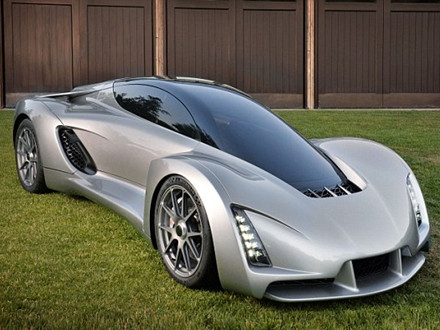The Blade, the first 3D printed supercar, weighing 90% less that traditional cars, can go from 0-60mph in just two seconds.
刀锋,首台3D打印的跑车,比传统车轻90%,可以在两秒内完成从0到每小时60英里的加速。
The Blade is created using a series of chassis parts held together by carbon rods - rather like a giant Lego kit.Its 700-horsepower engine can use either compressed natural gas or gasoline, and altogether it weighs just 1400lbs.
刀锋的底盘部件是由碳棒拼接而成,就像一组巨型的乐高玩具。700马力的引擎,可以由压缩天然气或者汽油驱动,总共才1400磅重。
Society has made great strides in its awareness and adoption of cleaner and greener cars.The problem is that while these cars do now exist, the actual manufacturing of them is anything but environmentally friendly.
社会已经有意识要采用更清洁、更环保的能源,并取得了长足进步。问题是,尽管现在有这样的车,其实际制造过程可一点儿也不环保。

Divergent Microfactories says its approach incorporates 3D printing to dramatically reduce the pollution, materials and capital costs associated with building automobiles and other large complex structures.At Divergent Microfactories, they've found a way to make automobiles that holds the promise of radically reducing the resource use and pollution generated by manufacturing.It also holds the promise of making large-scale car manufacturing affordable for small teams of innovators.
DM公司称他们的方法是融合3D打印技术,在制造汽车和其他复杂结构时大幅减少污染、节约材料和资金成本。在DM,他们找到了方法,可以减少汽车在生产过程中的资源使用和环境污染。有望让小型创新队伍也负担得起大规模的汽车生产。
The Blade is made using a proprietary solution called a Node: a 3D-printed aluminum joint that connects pieces of carbon fiber tubing to make up the car's chassis.This solves the problem of time and space by cutting down on the actual amount of 3D printing required to build the chassis and can be assembled in just minutes.
刀锋是用一种叫“节点”的专利解决方案制成的:一种3D打印的铝制节点连接起碳纤维管,组成车子的底盘。这样,制作底盘实际所需的3D打印的时间缩短了,三五分钟底盘就能组装完毕,既节省时间也不浪费空间。













